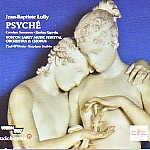If you fight it, you lose; if you just sit back and listen for six minutes short of three hours, you’ll experience the aural equivalent of a walk through exquisitely manicured gardens–perhaps too perfectly manicured–on a fine spring day. Only if you’re hoping for the type of drama and plot normally associated with opera will you be disappointed. Louis XIV himself chose the subject matter: Psyché, the most beautiful woman in the world, meets with the jealousy of Venus, who sends her son Cupid (Amour) to earth to give Psyché her comeuppance: once she sees him in his heavenly form, she must cease being human.
Along the way we meet Vulcain, Venus’ irritated husband, Zéphire, god of the winds, Aglaure, Psyché’s sister, and the King, Psyché’s father. There is comedy, much dancing, and plenty of room for those special recits-into-arioso-into-arias that Lully excelled in, with brilliant, shiny orchestration throughout. Near the start of Act 2, a magnificent palace is being built for Psyché at Amour’s behest; Lully uses chains as percussion and turns the scene into a beautiful, delicate version of Nibelheim or Siegfried’s Forging Song, with the Forgers striking in rhythm.
At an earlier point, in the first act, Psyché believes that she is to be sacrificed (a ploy of Venus); the news is met with laments–in Italian–that are simply stunning. The dark rumblings of Hell (Act 4) are very impressive; Bacchus’ song, with prominent guitar (Act 5), is especially charming. There are surprises galore, and around each corner is something more lush than before. As designed, it is an exquisite piece of artificiality.
Musical directors Stephen Stubbs and Paul O’Dette have reconstructed the score from several sources, clearly with an ear to good tunes, vigor, and allure. The exciting yet meticulous playing by the Boston Early Music Festival Orchestra, on period instruments (of course), is a pleasure to listen to, with the precise attack by the strings filled with drama, the woodwinds and brass–plenty of them–sharply delineated, and the percussion snappy. The continuo players, on harpsichords, theorbo, guitar, and viola da gamba, have much to do and do it superbly.
The singing is marvelous as well. Carolyn Sampson’s Psyché is lovely and makes dramatic sense; it’s not her fault she’s so beautiful, and you feel for her while reveling in Sampson’s untainted tone. Karina Gauvin’s Venus is the perfect foil–imposing and articulately nasty, with a voice of many colors. Colin Blazer’s Vulcain is a good picture of an overworked god; Jason McStoots’ Zéphire entertains. Amanda Forsythe as Aglaure is sympathetic to her sister Psyché, but the same soprano’s portrayal of a nymph in Act 2 is even more beautiful. Olivier Laquerre lends a nice, dark tone to the King. The remainder of the large cast is excellent. The last 20-or-so minutes of the opera are taken up with a pageant of gods, with one dance after another. My feeling was that enough was enough, but some people can’t get too much of this whipped cream. At any rate, this is a fascinating work, handsomely performed.
































